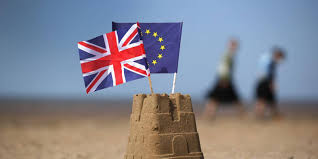UK-EU Seek Closer Ties After Brexit
Current Affairs International IssuesPosted by newadmin on 2025-02-05 09:04:53 |
Share: Facebook | Twitter | Whatsapp | Linkedin Visits: 28

UK Prime Minister Sir Keir Starmer is making strides in reshaping the United Kingdom’s relationship with the European Union. His recent visit to Brussels marks a significant moment as it is the first time a British prime minister has engaged with EU leaders since Brexit. This visit aims to strengthen cooperation in key areas such as defence, security, crime, and trade, especially in the face of global geopolitical challenges, including the ongoing war in Ukraine and the return of Donald Trump to the White House.
Brexit, the UK’s formal exit from the European Union, was completed on January 31, 2020, following a 2016 referendum in which 51.9% of voters chose to leave. The transition period ended on December 31, 2020, after which both sides negotiated the terms of their future relationship. Now, Starmer’s government is looking to establish a new phase in UK-EU relations. His administration is focused on improving ties without rejoining the single market or customs union. However, the approach has drawn mixed reactions. Conservative leaders argue that Labour is trying to steer the UK back towards EU membership, while others push for more extensive negotiations to address trade and regulatory concerns.
Defence cooperation has taken centre stage amid the ongoing conflict in Ukraine. The EU is increasingly recognising the need for self-reliance in defence, a stance echoed by the UK. Starmer has stressed the importance of economic measures against Russia to support Ukraine’s resistance. Security partnerships and intelligence sharing remain high on the agenda as both sides seek to bolster their defences against external threats.
Trade relations are another key aspect of the discussions. Negotiations include easing restrictions on food and animal products, as well as potential alignment with the EU’s emissions trading schemes. However, some proposals, such as youth mobility agreements, face political challenges due to concerns about freedom of movement. One significant development is the UK’s consideration of joining the Pan-Euro-Mediterranean Convention, which simplifies trade by removing customs barriers on components sourced from member countries. While this could benefit industries like automotive manufacturing, it could also expose some sectors to increased competition.
As Starmer works to redefine the UK’s relationship with the EU, his government faces the challenge of balancing political pressures at home with the need for greater economic and security cooperation with Europe. The coming months will be crucial in determining whether this diplomatic effort will lead to a more stable and productive partnership between the UK and the EU.
Search
Categories
Recent News
- Jemimah's Journey: Reflecting on Recent Growth and Success
- Cricket Diplomacy Falters: Pakistan's Costly Decision to Boycott India
- Trump's Deportation Drive: 700 Fewer Agents, But Minneapolis Still Under Watch
- Bus Inferno on Nandyal Highway Claims Three Lives
- Looming Financial Crisis for PCB: The Cost of Forfeiting the India Match
- Uncovering the Explosive Truth: Police Raid and Imminent Demolition
- Red Flag Rally: CPI(M) Andhra Pradesh Conference Combats Communalism
- Looming Financial Crisis for PCB: The Cost of a Boycott
Popular News
- Navigating IPO Market Dynamics Amid Volatility and Regulatory Changes
- Massive Worldwide Microsoft Outage Disrupts Multiple Sectors
- Panjapur Bus Stand to Reshape TNSTC Routes
- తెలుగుదేశం పార్టీ - పేదరికాన్ని నిర్మూలించడంలో వాగ్దానం
- Universities Embrace Remote Learning Technologies Amidst Ongoing Pandemic